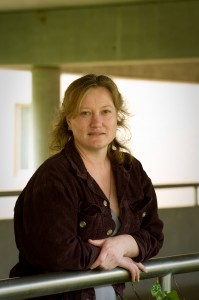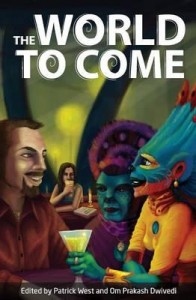
- Bronwyne Thomason
Our latest anthology, The World To Come, features short speculative fiction by nineteen writers from here and overseas. In this series of interviews we ask contributors about the story published in The World To Come, about their views on the speculative fiction genre, who and what influences their writing and for some inspirational tips.
1.What did you enjoy/find challenging about writing to this particular brief or theme?
Something that bothers me about serious science fiction is that I was once told by a bunch of sci-fi writers at a master class, that if it’s not physically possible or explainable by science, then it doesn’t belong in a science fiction story. I disagree. The line between sci-fi and fantasy should be very blurry for the very reason that if it can be imagined by the human mind, then it can be created or invented … eventually.
I quite enjoy getting lost in fantasy, since fantasy seems to be a natural state of meditation for me. Fantasy is like dreams and can be used in the same way as our minds use dreams to overcome and work through all sorts of personal problems without having to address them directly. Fantasy takes away a lot of the pain associated with recollecting and reliving nasty events in our lives in order to get over it and move on. Daydreaming is great!
I believe that symbolism from our dreams should be used in stories without question. If we can fly in our dreams, why can’t we fly in our stories? Besides, I have an ongoing curiousity with the world that might exist beyond our limited five senses. If we think about how dogs can smell and hear things that we humans can’t, then it is plausible to imagine that there is a lot more around us than we can actually sense. Could there be beings that live around us, every day that we don’t see or hear or even know about because we have only five, limited senses with which to observe the world? Children see monsters in the dark, under the bed. Maybe they are really there!
The world to come, might be a world in which we connect with and learn to use many more senses and open our lives to things of which we deny the existence, and that already exist.
2. Tell us about your story in The World To Come.
Flowdreaming is a method of meditation for connecting with the world beyond our existence. A bit off-beat, but interesting in any case. In it, you go into a meditation and connect with a kind of river that ‘flows all around us’. You join with a natural state of being, connect with nature, and literally ‘go with the flow’. The theory is that if you learn to relax and move through life appreciating the earth and the natural turn of events, you stop trying to go ‘against the flow’ and things will naturally fall into place for you in your life because you’re not wasting energy in swimming against the current.
In ‘Marty and the moon’ I used Flowdreaming as a method to discuss a very serious and sad situation that occurs in many families – that of sexual abuse and incest. My characters use the flow to deal with some horrible events in their young lives, and during their ‘flow’ event, which is a state of mind, they are able to re-live and work through it. In the end, there is just Marty and the moon. He gets his wish to be free of the troubles in his life and exist as a part of nature. It doesn’t stop or undo abuse, but it suggests a way of coping. The story is full of symbolism associated with the female body.
3. In The World To Come ‘science fiction mixes with fantasy, with realism in all its sub-genres, with speculative fiction, with the almost unclassifiable’, according to its editors. What thoughts do you have on the current status of short fiction in your part of the world and the genre/s in which you write?
As to the state of the market, I don’t know really, but I do I think short fiction is underestimated when it is in its purest form. There is too much emphasis on ‘good writing’ and too little attention paid to a good story. I’d like to see more acceptance of the weird, on stories that come from the heart, and less emphasis on narrative genius as a point of acceptance or rejection for publication. I don’t get it. A good editor can help a writer who has a vivid, creative imagination and encourage a new voice, but more and more do I see stories that have been pruned and cut so that they resemble topiary rather than beautiful natural gardens. I don’t mind strings of adjectives and strange metaphors and odd syntax. Imagination seems to be neglected at the cost of academic and writerly perfection. More dreamers, please.
4. Who, or what, inspires your writing?
I know you want a list of authors, here, so here you go: Winton, Jolley, Lawson, Paterson, Poe, Clarke, Carey, May Gibbs, Orwell, Jung, Takolander, John Bartlett, Cootzee, Jo Langdon, Richard Flanagen, The Herald Sun (for comedy), McCooey … … and so on.
Seriously, what inspires my writing? Death. Sad stuff. My children. Dreams.
5. Tell us what you do if you haven’t written anything in a while and you want to get started writing again? Could you share your favourite writing exercise with our readers?
Go for a bike ride or a walk. Read the newspaper. Visit the ocean. Daydream.
Bronwyne Thomason is a writer and parttime tutor at Deakin University. She has earned a Bachelor of Arts (Writing) with First Class Honours from Edith Cowan University in Perth, holds a Master of Fine Arts in Writing from Swinburne University in Melbourne and is currently a PhD Candidate with Deakin University in Geelong, Victoria.
View the booktrailer for The World To Come here.
You can purchase The World To Come as paperback or ebook, here.
Follow Us:
Share this page:
